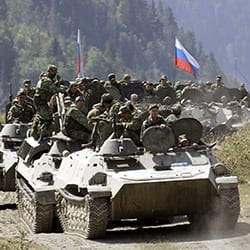In a surprise move, Russian President Vladimir Putin announced Monday that Russia would begin to withdraw the “main part” of its forces from Syria. The Assad government — on whose behalf Russia launched its Syrian intervention nearly six months ago — declared that it had agreed to the “reduction” of Russian forces. On Tuesday, there were reports that Russia indeed had begun removing military aircraft from Syria.
The Obama administration was blindsided by Russia’s move; so were most foreign policy experts. If the announcement proves one thing, it is Putin’s abiding ability to defy prediction. But what else might the move signify?
First, we need to be wary of accepting Putin at his word. Russia’s recent behavior elsewhere — notably in the Ukraine — suggests that Putin’s announcement should be approached skeptically. How complete will the Russian withdrawal be? Declaring that it will withdraw the “main part” of its forces allows Russia a lot of wriggle room. In fact, Russia has already said it will retain its naval and air bases in Syria. Russia also has announced that it will continue airstrikes against “terrorists” in the country. (In practice, Russian airstrikes against “terrorists” includes attacks on much of the armed opposition to Assad.) Moreover, nothing will stop Moscow from upping the military ante yet again in the future, should Putin decide to do so.
There is huge speculation about the reasons behind Putin’s move. This article in The New York Times highlights some of the complicated factors that could be driving Russia’s decision. Russia may simply be “declaring victory” and avoiding being drawn further into the Syrian quagmire; while Russia has bolstered the Syrian government’s position on the ground, it is simply not in a position to hand Assad victory in the Syrian civil war. Russia may be sending a message to the Assad regime that the latter ought to take a more accommodating line in the current Geneva peace talks; if the negotiations actually achieve progress toward a peaceful settlement — a very big “if” — Putin will burnish his credentials as a statesman.
Did the Russian intervention “succeed”? In the short-term, yes. Russia did indeed help reverse what appeared to be a deteriorating military situation for the Assad government. By intervening, Moscow bolstered a long-standing Russian ally in the Middle East. Moscow also became an even more important player in talks aimed at resolving the Syrian crisis; Russia’s intervention forced the United States to take a less forceful stand on Assad’s ouster. But Russia also incurred some costs due to its intervention. Some of these are monetary. Buffeted by economic sanctions and low oil prices, Moscow can ill-afford sustained military action in Syria. But there have been geopolitical costs as well. Most notably, the Russian intervention prompted an ugly confrontation with Turkey that likely will damage relations between Ankara and Moscow for years to come.
In the longer term, the success of Russia’s Syria policy very much depends upon the ultimate survival of the Assad government. And that, of course, remains very much in doubt, no matter the results – if any – of the Geneva talks.
Joe Barnes is the Bonner Means Baker Fellow at the Baker Institute.
